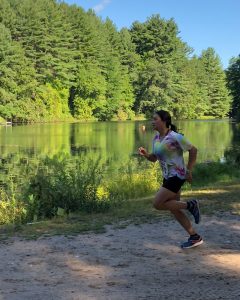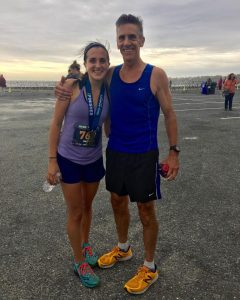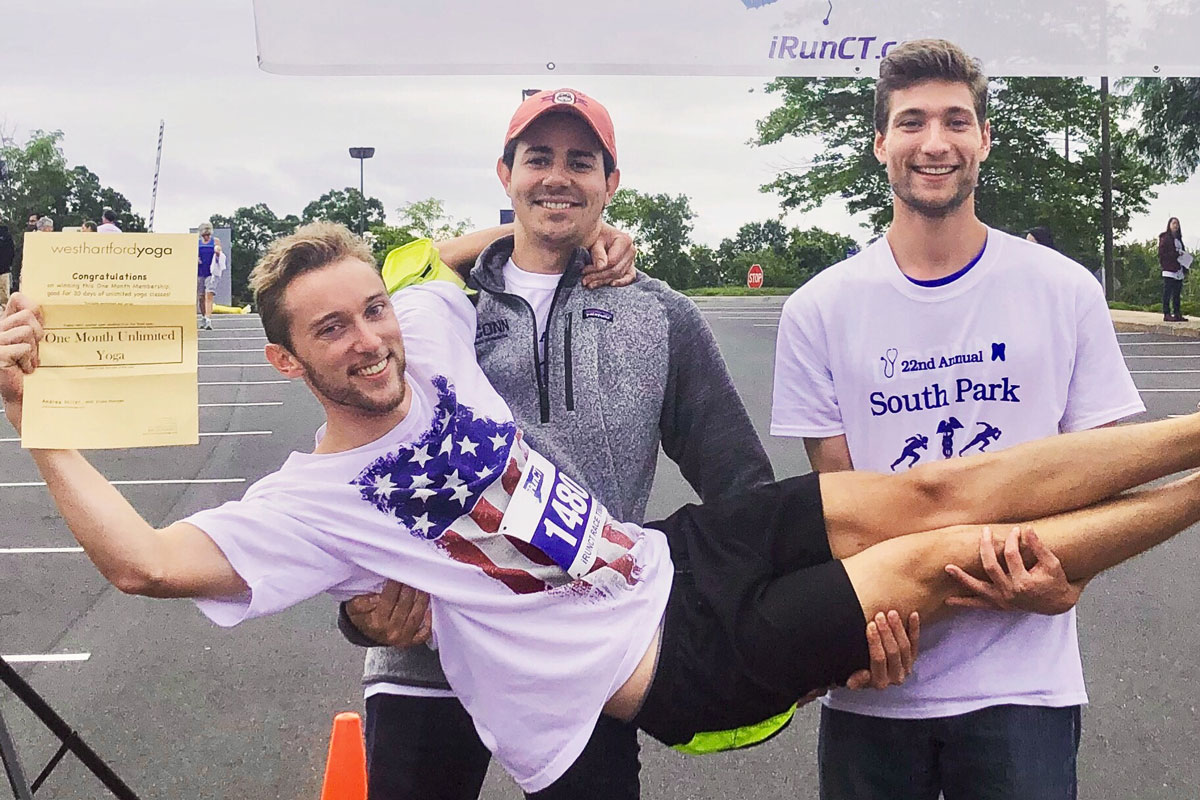Some of the participants in this weekend’s UConn Health Half Marathon, 10K and 5K are UConn medical students. Four third-year students who are runners – Keanna Chang, Liz Rodier, Ian Whittall, and Max Gaudio – share their thoughts on what motivates them to lace up their running shoes amid what is sure to be one of the most demanding schedules of their lives.
What do you get out of running?

Chang: Running is my main form of exercise, helping me stay strong and keeping my endurance up. It also helps me wake up. I usually run first thing in the morning and it’s a great way to get myself mentally prepared for the day. Probably one of the most important aspects of running for me, though, is its effect on my mood and mental health. Through running, I have been able to get to know my body and better understand what it needs. I know when my muscles ache but can be pushed harder but am attuned to when my body needs a break. When I run, I turn the stress of med school into fuel to push me onward.
Rodier: I get so much more out of running than just physical benefits. Going out for a run gives me the time and space to clear my head and reset mentally. I love feeling in shape and strong, but also focused and level headed after a good run!
Whittall: Noticing the tug of my shoes on the asphalt under my feet with the smell of crisp autumn pine-needles that remind me of my hometown neighborhood and the feeling of a hundred wisps of air racing into and then out of my chest. Slowing to a halt at the end of my run and the feeling of elation catching up to me, despite the ache of my legs. These are all reasons why I run, and while every run certainly doesn’t always go this way, I work to reach this experience most days as a way of alleviation and escape. It keeps me going, it’s something to look forward to every day, and I think it would be so much harder to live without.
Guadio: Running gives me so much. It got me fit, it’s the best warmup for pretty much any exercise, it allows me to eat like Michael Phelps, and it’s the best way to start a night out. It’s also one of the first things I want to do when I travel and discover somewhere new. When I’m somewhere new, I never want to stop exploring and discovering what’s beyond the next turn. Running is also one of my favorite ways to experience nature. Maybe more importantly, pushing myself on runs showed me how to set new goals and challenge myself even when I don’t think I can push anymore. Seeing myself improve and get faster during my first year of high school crew really showed me what was possible with consistent hard work. I can’t overstate how great that was for me. Aside from that, it’s probably the most effective antidepressant to boot.
How much time do you spend running, and how do you fit that into a busy medical school student’s schedule?
Gaudio: I try to run at least five days a week, or substitute something like it if it’s raining or otherwise not possible. But there’s really no substitute to being out on the trail.
“Honestly, it is all about prioritizing; if you really care about something, you will find a way to make time for it!”
—Ian Whittall
Rodier: I typically go for a run around three times each week, sometimes more or less depending on the weather and my schedule. Pre-pandemic I would go for a longer run on the weekend when I had free time, then during the week I would fit in my runs either before or after classes. Now given the flexibility of virtual classes and studying, I enjoy going out for a run at any time of day. My favorite is early morning when the streets are clear and the air is fresh!
Whittall: I typically run around six days a week. When I am training for a marathon, I typically run anywhere from 45 minutes to three hours a day. Right now, I run around an hour a day. Medical school is a bit of a time crunch, but everyone finds some time to take breaks. I find that working out is a great way to re-energize myself mentally, and so I typically try to fit my runs in right after classes or a patient shift, or just as a study break. Honestly, it is all about prioritizing; if you really care about something, you will find a way to make time for it! Also, you can be very efficient and listen to lectures or medical podcasts, which I have tended to do on longer runs or when I am particularly stressed about all the work.
Chang: I usually run about 3.5 miles, so my runs take a little over 20 minutes every day. Pre-pandemic, I was running before class every morning, which usually meant getting up at 5:30 and running before the sun woke up, but this wasn’t always as terrible as it might sound because I would usually be able to see the sunrise!
How has the shutdown of normalcy impacted your running – are you running more now?
Chang: My running schedule is thrown off, in that I don’t run first thing in the morning any more. I spend the majority of my day studying for my upcoming board exam, so an afternoon run is a nice break from sitting and staring at a computer screen. I’m not necessarily running more, but I am finding more ways to be outside – biking more, social distance walks with friends.
“I honestly can’t imagine there being any better piece of advice to my future patients than to give exercise a shot and see how it makes everything better.”
—Max Gaudio
Gaudio: The shutdown has been nothing but helpful for my running. Finding the time to hit the trails when the sun is setting after DOCC or VITALS during the winter in stage 1 was often pretty hard, but now I can plan my day around the run instead. I’m firmly on team anti-treadmill, so this is pretty huge for me. Plus, all the animals are out now and I frequently find myself running alongside deer or under a heron. You can’t beat that company. All in all, I’ve run a lot more now.
Whittall: The shutdown really has not impacted my running much at all. Unfortunately, at my stage in medical school, we are all about to take, debatably, the most important exam during the four years. So, I have mostly been taking all the free time I can get for studying and keeping my running about the same.
Rodier: In the past weeks, I have been running more, as I am training for the UConn Health Half Marathon. One of the benefits of having virtual classes is that I can go for a run any day of the week without having to plan time into my schedule!
Think ahead to when you are a practicing physician, and describe what you tell your patients about the importance of exercise (even if it’s not distance running).
Whittall: Most people know that exercise is one of the single best things you can do for your mental health. Many people who do not exercise quite as much as we might want often say they are just too tired or do not have enough time, which is completely fair. But what most people do not realize is that moderate to light exercise even just for 10-minutes at a time, a couple times a day, is all it takes to be really beneficial. Sometimes it can be daunting to start a new regimen or work towards your next goal. If the motivation is not always quite there, and I think it might be a problem going forward, I personally find that telling people what I am going to do – whether it is doing a workout or finishing a race with a particular goal – really helps to keep myself accountable!

Rodier: When I become a physician I hope to encourage my patients to incorporate exercise into their routine. Exercise is extremely important for physical health and mental health and has countless added bonuses such as improving longevity and elevating the mood.
Gaudio: Exercise has done more for me than probably any other long-term habit has or ever will do. It’s fitness, mindfulness, therapy, and free energy all in one, and you can’t say that about any medical intervention. I honestly can’t imagine there being any better piece of advice to my future patients than to give exercise a shot and see how it makes everything better.
Chang: Exercise has so many positive effects on our bodies – we are not made to be sedentary! It makes us strong, it conditions our heart and lungs to be more able to deal with certain diseases, it keeps our joints from getting stiff and painful, it helps us maintain our balance and agility, and it helps us maintain a healthy weight. Exercise helps us understand and feel more connected to our bodies. Exercise also releases endorphins that do wonders for boosting mood – the runner’s high is no myth! Plus, exercise can be so much fun! If running isn’t your thing, there are so many ways to be active that don’t just involve left turns on a track. Hiking, biking, soccer, basketball, rock climbing, kick boxing, the list goes on and on. Grab a friend and try something new!
Learn more about or sign up for the UConn Health Half Marathon, 10K and 5K, June 4-7.



